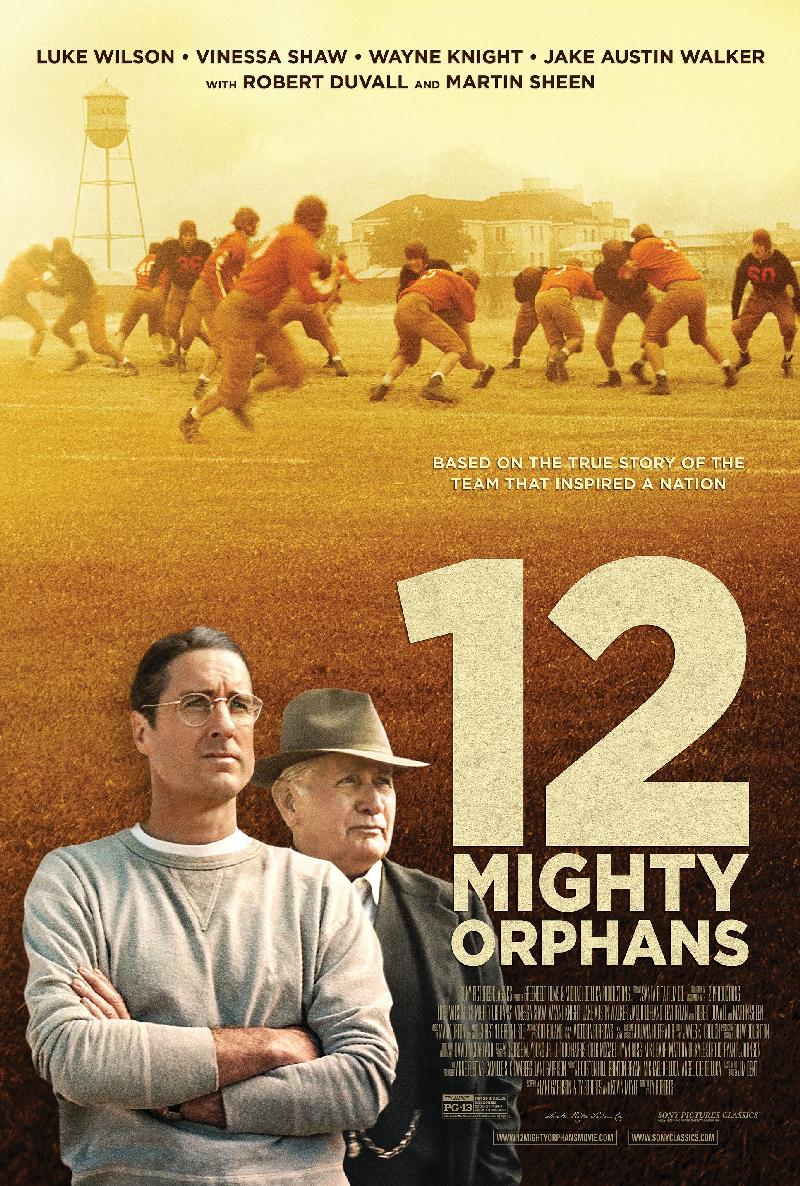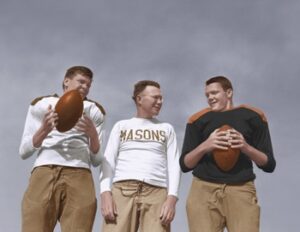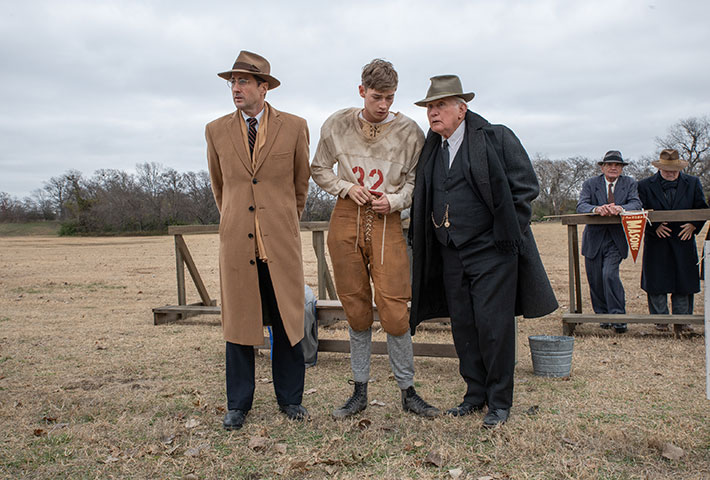 *“12 Mighty Orphans,” releasing today (06-11-21) in Texas, and nationwide June 18 for Father’s Day weekend, is a non-fiction story documented in the best-selling book by Jim Dent titled “12 Mighty Mites.”
*“12 Mighty Orphans,” releasing today (06-11-21) in Texas, and nationwide June 18 for Father’s Day weekend, is a non-fiction story documented in the best-selling book by Jim Dent titled “12 Mighty Mites.”
Based on actual events, the story is about a group of lowly Depression-era orphans recruited to form a football team, the team’s name, “Mighty Mites,” was derived by the diminutive stature of the young boys. Miraculously these outliers went from playing without shoes—or even a football—to play for the Texas state championships. because of the leadership of their coach Rusty Russell.
“Recognizing that his scrawny players couldn’t beat the other teams with brawn, Rusty developed innovative strategies that would come to define modern football. Over the course of their winning season, these underdogs and their resilient spirit became an inspiration to their city, state, and an entire nation in need of a rebound, even catching the attention of President Franklin D. Roosevelt,” as stated in the film synopsis by Sony Pictures.
MORE NEWS ON EURWEB: Rahsan-Rahsan Lindsay Named CEO of MediaCo Holding, Inc., Owners of HOT 97, WBLS

The film takes viewers on a visceral roller coaster of pain, joy, inspiration, and triumph. Austin, Texas-based filmmaker director Ty Roberts, “The Iron Orchard,” initially passed on directing the project because he felt it would be another banal football movie with apparent clichés.
“My [film producing] partner Houston Hill approached me about the book and said, what do you think about 12 Mighty Orphans? I looked at it several years ago and wanted to option it. I immediately said that sports films I feel like they’ve been told. So many films that I see in the sports genre tend to touch upon the same tropes very much so what our story is: the coach comes to a new team, the underdogs, there’s a star player who doesn’t quite fit in with everybody, and lo and behold it had all that. But then I learned and read about Rusty and realized the connectivity to a true story and the historical aspect. I thought here we have a man who was at Temple High [School], who was at the top of his game, who mysteriously leaves Temple to go to the Masonic Home Orphanage with his wife to start anew. In this unique perspective of America and when things were hard enough as it was, wow, that is a huge selfless act.”
The enduring spirit of Rusty Russell convinced Roberts to tell this story. As stated prior, Russell held a suitable coaching position at Temple High School, and in 1925 where his football team landed in the state semifinals, and decided to pivot to become a coach at the Masonic Home and School orphanage established by Fort Worth’s lodge in 1899 sharply.
Rusty Russell, portrayed by Dallas native Luke Wilson, is considered an American hero and icon in Fort Worth, Texas. Russell served as a medic during World War I in France at the Battle of St. Mihiel. German soldiers dropped poisoned mustard gas on Russell’s platoon, and he lost his eyesight for a day. Yet, Russell continued to administer support to his comrades while dealing with what would appear permanent blindness. The damage was so severe to his eyesight that he was in a Parisian hospital for the next six months. During that period, he pledged to God that he would commit the rest of his life to help children if He restored his eyes.
Russell was able to fulfill his promise when his friend accepted a coaching job at the Masonic Home and then decided to rescind. Thus, allowing Russell to bring inspiration and hope to a band of orphans whose spirits were reeling from the trauma of being abandoned by their parents, their self-worth was undoubtedly shattered during the dismal and hopeless period of the Great Depression. During this period, orphans were considered second-class citizens, stigmatized as misfits and outcasts, often referred to as inmates. However, they did not commit any crimes as the film describes. Yet through Russell’s faith, God would use him to create beauty from ashes.

Roberts states, “Russell has a lot of self-motivation and a lot to give back. Rusty lifted the kids’ spirits, guided them, and mentored them using football to motivate them. I thought it was a unique perspective to the story.” Russell’s legacy continues to permeate throughout Fort Worth, and Roberts recalls that the stories of Masonic Home and Rusty Russell are ongoing conversations throughout the town and that Russell’s memory is in the locals’ spirits. Due to more favorable tax laws, Texas often loses opportunities for films being shot there to other states like Louisiana, Georgia, and New Mexico. In fact, “Orphans” was almost filmed in Oklahoma. However, Mayor Betsy Price, the Fort Worth Film Commission, and the generosity of George Young Jr., an oil and gas businessman who resides in Westover Hills, an area in Fort Worth, are the main reasons the movie was filmed there. Many prior potential investors like Dallas Cowboys owner Jerry Jones and former Cowboys fullback Daryl “Moose” Johnston passed on the project. Still, Young agreed to finance the film and even covered the costs when the movie went over budget.
Principal photography started in the fall of 2019, the ability to shoot at locations such as Weatherford, Cleburne, Farrington Field, and Gateway Park, with a little help of CGI, helped to bring a level of authenticity to the film.
Principal photography started in the fall of 2019. The ability to shoot at locations such as Weatherford, Cleburne, Farrington Field, and Gateway Park, with a bit of CGI help, helped bring a level of authenticity to the film. Roberts even made one step further and cast locals as extras and main characters instead of using Los Angeles character actors. “I cast about eight or nine local boys as the twelve mites, let alone all the extras. It was super inclusive on that level, where we probably helped support the dreams of a lot of local boys and children in general. It may have a lasting impression on them. We may have changed their lives. To me is that is incredible to have that impact on these boys who [wanted to become] actors but didn’t know how to.”
The young actors’ performances are flawless and authentic, that audiences will be surprised to know this was their first acting job and the first film for some of the actors. Like newcomer Woodrow Luttrell, who at the time had little acting experience, plays the character Leon Pickett, the punter who has the penchant for spewing expletives, came to the casting call straight from working on an Alaskan fishing boat. Roberts gleefully remembers that Luttrell was wearing dirty Wranglers and a farmer’s hat, which was the level of realism he set to achieve. “He didn’t have any clue what he was getting himself into but turned out to be one of the more endearing characters of the story,” says Roberts.
Football became the backdrop to the lives of these young boys. It was the aim of Roberts and screenwriter Lane Garrison, who also co-stars as the character Luther Scarborough, not to make this just another “football inspirational movie.” The duo decided not to frame football as the central protagonist because the richness of the story stems from Rusty and his wife Juanita, played by Vinessa Shaw, and the events that occurred at the orphanage. Instead, the film chooses to explore the adversity the couple encountered while Russell was assembling the team, instilling the importance of education into the boys, and exposing the orphans’ backstories. “It was important to have the dramatic structure and not one-hundred percent tied to football which is hard to do. When you have such a rich, historical story on these other characters, you want to utilize it at the same time; you have to be careful. You can’t delve too deeply into everybody’s background,” says Roberts. Football, in a sense, was the catalyst that allows the story to explore Russell’s journey in dealing with his trauma, fragmented childhood, and the loss of significant family members, Russell’s lives vicariously through the lives of these young boys and emotionally heals.
Healing is what our nation is currently going through after being ravished by Covid-19 parallels the despair the many felt during the Great Depression, the loss of jobs, the economy tanking, the hopelessness people felt as they struggled to hang onto a thread of hope.
Roberts sums the timely significance of his film with, “I hope people walk out of the theater with a little pep in their step and inspiration to go out there and pursue their wildest dreams. And realize that hard times, all adversity, with a little persistence and forethought on how to achieve your dreams and goals, we can all get there. If Rusty Russell can do it with the Mighty Mites and take on the bigger teams and be innovative and be persistent and dedicated to it, so can we. Coming out of 2020 like this, a little bit of that motivation and tied back to the family and our society, lifting one another and helping one another to come through. Like Rusty, we have to start anew, and that led him to become one of the greatest coaches in Texas football.”
We Publish News 24/7. Don’t Miss A Story. Click HERE to SUBSCRIBE to Our Newsletter Now!





